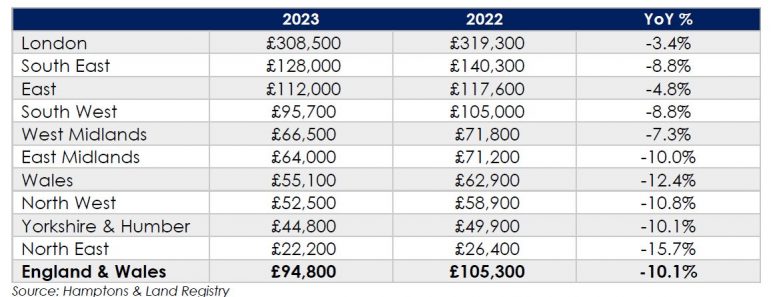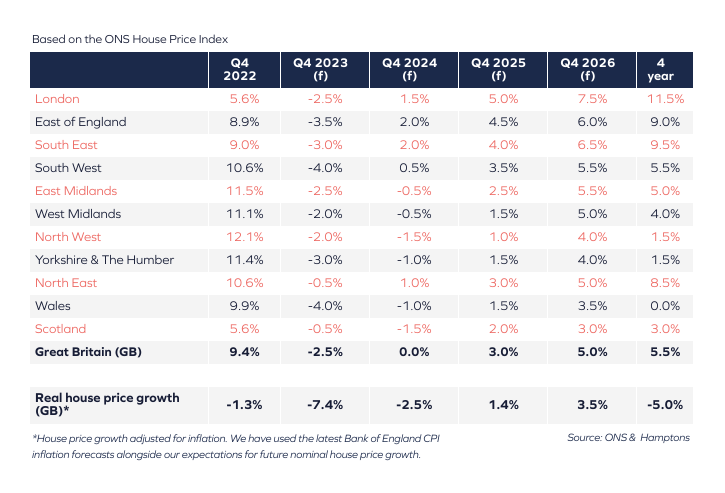 Rents are set to rise sharply over the next few years, as buying a house gets further out of reach for many.
Rents are set to rise sharply over the next few years, as buying a house gets further out of reach for many.
For renters the news is bleak. Rents are predicted to increase by an average of 25% between now and the end of 2026 owed in part to rising mortgage costs and a widening supply-demand imbalance in the PRS.
Expensive mortgages have deterred many first-time buyers, who are now renting instead in the hope that rates will fall in the new year – causing intensified competition in the rental market.
Although house prices are expected to fall further in the near term, there are tentative signs of recovery within the next 12 months or so.
Hamptons, part of the Connells Group, forecast that rents will rise 25% over the next four years, outpacing 5.5% price growth across Great Britain.
The estate agency expect the Office for National Statistics (ONS) House Price Index to show an average house price decline of 2.5% across Great Britain in the final quarter of this year. In real terms (adjusted for inflation), this will represent a 7.4% annual fall.
As mortgage rates gradually fall and households benefit from real income growth, Hamptons expect price falls to stop in 2024. They estimate that prices will be flat in Q4 2024, followed by a 3% increase in Q4 2025 and 5% in Q4 2026 across GB.
Taking inflation into account, average prices in Great Britain will have declined by nearly 10% between the start of 2023 and the end of 2024. This will contribute to around a 5% decline in real house prices over the next four years.
It is predicted that 2025 will mark the beginning of a new property market cycle with London starting to outperform all other regions for the first time since 2015 with 5.0% annual price growth. Overall, London will see the strongest growth between 2023 and 2026 of 11.5%, with prices in Wales likely to remain flat.
Hampons forecast just under 1m transactions across GB in 2023, a 19% decline on the 1.23m completions in 2022. Slightly lower mortgage rates and improved affordability in 2024 will encourage 1.1m completions.
The forecast suggests that transactions should recover to at least their pre-Covid norm in 2025 as lower mortgage rates unlock moves from previously priced out households. However, a higher interest rate era will mean that the new norm will be between 1.2m and 1.3m transactions each year, rather than the 1.3m-1.4m we predicted last year.
The build-up of long-term supply issues combined with rising landlord costs will continue to put pressure on rents. We forecast the average rent on a newly let property in Great Britain will rise 8% in Q4 2023, 7% in Q4 2024 and 5% in both Q4 2025 and 2026.
London rents are likely to rise faster than the GB average in 2023 and 2024 (by (9% and 8% respectively). A combination of lower yields and more landlords being reliant on finance will put added pressure on investor profits in the capital.
Aneisha Beveridge, head of research at Hamptons, said: “Despite rising rates and the cost-of-living crunch catching many households off guard, it’s becoming increasingly clear that the house price crash that some forecasters envisioned hasn’t materialised. Rather, we expect a minor price fall in 2023 followed by a slower recovery over subsequent years as households adjust to an era of higher rates. This will be more akin to the U-shaped downturn of the early 1990s than the V-shaped crash and subsequent speedy recovery in 2008.
“On paper, the house price falls we forecast are minor in nominal terms. But high inflation for other goods and services means that in real terms, the average price of a home will have fallen around 11% between 2022 and 2024. This essentially reflects “the correction” caused by higher rates. It’s also why we expect prices to rise again in both real and nominal terms from 2025 as rates fall to their new normal and a new housing cycle begins.”
Rental growth forecast on newly let properties
| 2023(f) | 2024 f) | 2025(f) | 2026(f) | 4-year growth | |
| Great Britain | 8% | 7% | 5% | 5% | 25% |
| London | 9% | 8% | 4% | 4% | 25% |
Source: Hamptons
Beveridge added: “There’s a strong argument that the Bank of England’s quest to quell inflation has hit the rental sector harder than any other part of the housing market. A build-up of long-term supply issues combined with soaring landlord costs is putting upward pressure on rents. And it’s hard to see any of these pressures receding any time soon, which is why we expect rents to continue rising over the next few years.”
The average rent on a newly let property in Great Britain rose by 9.9% in July, marking the 27th consecutive month in which rental growth has exceeded 5%. Despite affordability pressures for tenants, the shortage of rental homes combined with rising landlord costs will continue to put pressure on rents. There were 43% fewer homes available to rent across Great Britain in July than the same month of 2019.
Given that 68% of landlords own a buy-to-let with some sort of finance, rents will primarily be set by where interest rates settle in the medium term. We forecast rents will rise by 25% across Great Britain between 2023 and 2026, with the largest increases during 2023 and 2024 as landlords roll off fixed term deals and face considerably higher mortgage payments.
This will likely put the average rent of a home in Great Britain at £1,550 per calendar month (pcm), £333pcm more than in December 2022. Despite this rental growth, many landlords will still find themselves materially worse off than a couple of years ago.
We think rental growth will be led by the North of England and London over the next year. hese are places where larger portfolio landlords, which are more likely to be reliant on some form of finance, are most active. London is also the lowest yielding region in the country on average and so landlords here have less ability to absorb higher costs.
However, steeper borrowing costs are not the only issue, with substantial regulatory reforms on the horizon. The Renters Reform Bill is likely to further add to landlords’ costs, and more regulation may well be in the pipeline whichever party wins the general election.
So far, transactions, rather than house prices, have borne the brunt of the slowdown. HMRC figures show that there were 555,780 sales in the first seven months of this year, 128,730 (19%) fewer than in the same period of 2022, during the post-Covid boom, and 12% fewer than in the first seven months of 2019.
Since mortgage rates hit a new peak in July, there is unlikely to be a meaningful uptick in transactions in the second half of the year. We think that the total for 2023 will be just under one million. This will be the lowest number of residential completions since 2012. But more significantly, it will also be just below the total of 2020 when there were 1.02 million, despite multiple lockdowns.




Its cheaper to buy than rent and there are no controls on affordability. We, as predicted are now seeing tenants getting behind with the new rent asking prices’. I have one particular family with children who cannot afford the hikes and have been A1 tenants for years, now about to face eviction with no-where to go. Landlords have been warned and in the main most have listened and been sensible but others ……… absolute greed because Joe in the pub is getting such high rent! Landlords selling up continues.
You must be logged in to like or dislike this comments.
Click to login
Don't have an account? Click here to register
I congratulate Shelter, Generation Rent and the faux Tory Government on their success in persuading landlords to sell up. The law of supply and demand now reigns and with low supply, rents go up. I feel sorry for Woodentop’s tenants. I only ever increase rents at the start of a tenancy, never during and some have lasted for six years plus.
You must be logged in to like or dislike this comments.
Click to login
Don't have an account? Click here to register